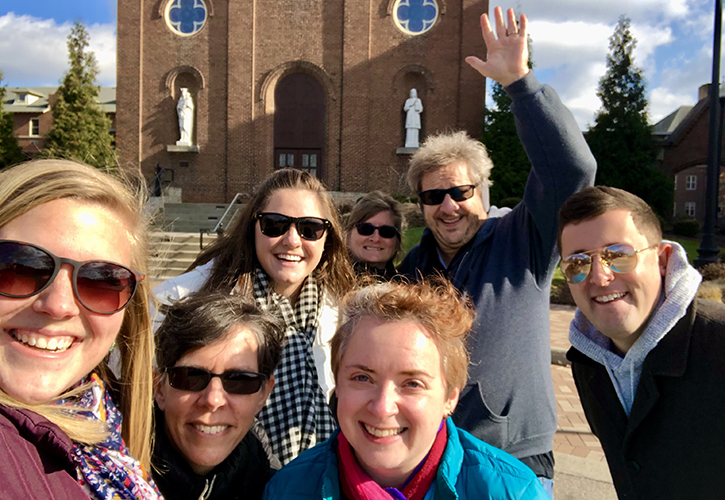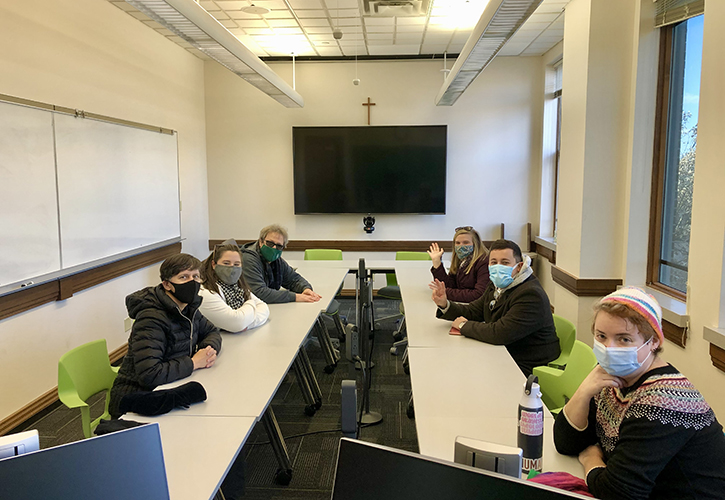College of Arts and Sciences Newsroom

Hybrid religious studies courses offer online master’s students ‘true classroom experience’
By Dave Larsen
University of Dayton graduate student Marisa Ferrara was attending her pastoral counseling class in late April when she heard someone calling for help. She shut off her computer’s camera, sent a text asking her instructor to record the class, and went outside to help the woman, who was fleeing a domestic altercation.
Ferrara and her husband brought the woman into their home, locked it down and called police. She then ministered to the woman, speaking calmly and letting the frightened stranger know she was safe.
“Pastoral care in real time,” said Elizabeth Groppe, professor of theology and director of the Department of Religious Studies’ Master of Arts degree programs.
Ferrara, a mother and children’s ministry coordinator in Raleigh, North Carolina, is pursuing her master’s degree in pastoral ministry at UD through a “hybrid” program that allows students to take courses online or in-person. The courses are offered in both modes at the same time, allowing remote and residential students to interact as if they were seated in the same classroom.
The Department of Religious Studies launched two hybrid master’s programs in August 2021, offering degrees in pastoral ministry and theological studies. The programs require 36 semester hours and are open to full- and part-time students.
“I really like the format of the hybrid program, because a lot of the online degree offerings at other schools are not live,” said Ferrara, who couldn’t relocate to Dayton to pursue a master’s degree because of her family and job. “There are papers that you write or threads that you contribute to or recorded lectures, but this offers a real, true classroom experience, while still being elsewhere.”
The University revamped two classrooms for the program, with microphones suspended from the ceiling and dual monitors that allow the instructor to have remote students on one screen and visual presentation materials on the other. The classrooms also have a large screen that allows the students in the classroom to see the presentation visuals and the students who are joining remotely.

Enrollment in religious studies master’s programs jumped from six new students in 2020 to 15 in 2021. The latter cohort included six hybrid students. In addition to Ferrara, they also include:
- Jason Powell, teaching professor of honors humanities at Ball State University in Indiana.
- Suzy Streeter, a retired Air Force colonel from Colorado Springs, Colorado.
- Noelle Collis-Devito, a mother of four and associate director of ministry for persons with disabilities for the Archdiocese of Cincinnati.
These students bring greater diversity to the master’s program, said Amy Doorley, the department’s coordinator of graduate studies.
“In our residential program, most of the students are recent graduates from undergraduate and one-year volunteer programs,” Doorley said. “Now they are in the same classroom with people who are at another stage of life and have a lot of life experience, which they contribute to conversations in the classroom. So, you have that combination of youthful energy and the wisdom of experience.”
Dennis Doyle, professor emeritus of religious studies, approached his first class of the hybrid program with strategies for “overcoming built-in difficulties of such an endeavor.” It turned out to rank among the best teaching experiences of his career.
“This cohort was fantastic,” said Doyle, who retired in May after 38 years at UD. “I won’t say we got to the point where we forgot who was remote and who was present in the room, but we came close. The students themselves were dedicated to making this work. There was an unusually large number of standout personalities, but the students worked to make sure that everyone was included, listened to and respected. There were technical difficulties, especially in the first few classes, but the good will and team spirit of the class overcame all obstacles.”
That spirit extended to “Friendsgiving,” an in-person gathering last year in Dayton on the weekend after Thanksgiving. Remote students including Ferrara, Powell and Streeter visited campus and shared a meal with faculty and fellow students.
“As a Marianist university, community is really important,” Groppe said. “I’ve just been delighted to see how that spirit has permeated the hybrid program, despite the challenges of people being remote.”
Friendsgiving was Ferrara’s first trip to Dayton. She applied for the master’s program online, on the “strong recommendation” from a co-worker who is a UD alumnus. She said touring campus made her feel proud to be a Flyer.
As a remote student, Ferrara was grateful her class could be recorded, so she wouldn’t miss a minute after stepping away to help someone in need.
“It was interesting that I’m in a pastoral counseling class and then, at the very moment, using some of those techniques, literally with class running in the background, trying to help this woman,” she said. “It was ironic and yet kind of beautiful, and I was appreciative of a lot of these things that I had learned and was then able to utilize in my class.”
For more information, visit the Department of Religious Studies’ online master’s program website.
